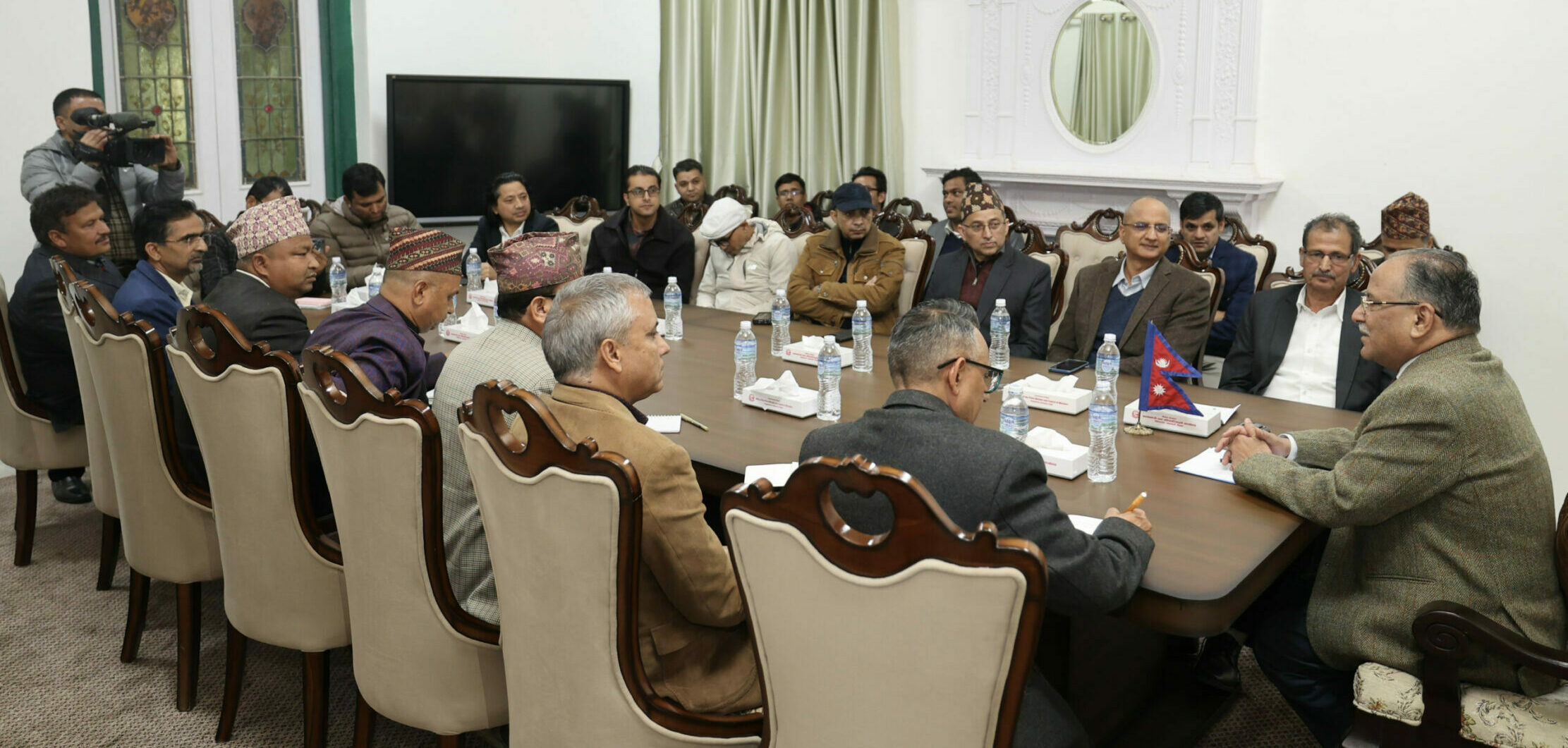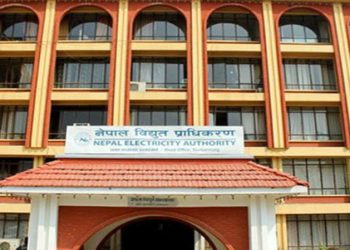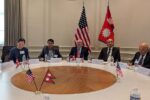KATHMANDU: In a noteworthy engagement. Prime Minister Pushpa Kamal Dahal Prachanda graciously welcomed journalists into a serene room situated in the newly refurbished office in Singha Durbar.
Expressing, “You’ve arrived amidst the news of the moment. Welcome to the revamped workspace; please take a look at my office, restored to the design reminiscent of Chandra Shumsher’s era.”
This report stems from a journalist’s visit to Singha Durbar, driven by a commitment to provide the public with authentic information about the Chief Executive’s thoughts and actions.
Understanding the imperative for people to be aware of Prime Minister Dahal’s perspectives, the journalists embarked on a mission to reveal the complexities beneath the surface.
During the interaction, Prime Minister Dahal exhibited a degree of ‘confusion’ centering around five critical issues.
Migration Trends: PM Dahal expressed bewilderment over the migration of people who, despite having access to food and securing government jobs, choose to relocate abroad.
Economic Dilemma: Despite promising government figures, PM Dahal questioned the sluggish pace of economic growth, highlighting a disparity between statistical data and practical outcomes.
Electoral Apathy: Puzzled by the lack of voter turnout despite extensive development efforts, PM Dahal cited the example of his home district, Chitwan, to underscore the paradox.
Ncell Case Nuances: The Prime Minister adopted a softer tone when addressing the Ncell case, raising eyebrows with his nuanced expression on the matter.
Journalistic Allegiance: PM Dahal questioned why journalists, initially assumed to be anti-monarchists, were seemingly digging against the government. Notably, a ‘soft threat’ issued during this interaction did not deter the inquiry into this unexpected journalistic stance.
In nations where the salaries of prime ministers and ministers do not exceed Rs 70,000 to 75,000, a pressing question emerges: Can we all afford to seek opportunities abroad?
Beyond these points of confusion, Prime Minister Dahal enumerated a list of achievements and outlined future plans from his one-year term.
Additionally, he shared insights on various news topics, including Nepalis joining the Russian army, the TikTok ban, and the concept of a Hindu Rastra, some of which were previously covered by Khabarhub on Sunday.
Now, let’s delve into the narrative shared by Prime Minister Dahal about his recent visit to Rukum, which left him deeply affected.
“Upon my return from Rukum, I was genuinely ‘shocked’ by what I witnessed,” he said.
“During my evening in Rukum, a disheartening account surfaced from one village, involving the headmaster of the local high school. Despite receiving a monthly salary of 70,000 to 80,000 rupees and possessing personal land, he chose to migrate to America after spending a substantial amount, leaving behind a void in the teaching staff.”
PM Dahal continued to say, “Astonishingly, this trend extended to other educators who had also invested significant sums to travel to America via Mexico, resulting in a noticeable dearth of teachers in the village. This revelation left me perplexed.”
He stated: The question arises: What is the underlying issue here? It’s understandable that the employment landscape in Nepal may not be ideal, making it challenging to secure stable jobs and repay debts.
According to him, however, the perplexity deepens when individuals with a comfortable life at home, earning salaries ranging from 70,000 to 80,000 rupees, choose to leave.
“I heard mention of a village of Rukum residents in America, prompting me to reflect on the root of this phenomenon,” he said.
He continued to say: “The sense of nationalism and patriotism among Nepalis seems to be undergoing a severe test. Even with employment opportunities and the implementation of mega projects, sustaining a salary of 5 to 7 lakhs for 10 to 20 years proves elusive.”
Despite record foreign currency reserves and remittance inflows, the economic condition of the populace seems to worsen, accompanied by a brain drain and capital outflow.
“This reality becomes even more glaring when individuals in responsible positions, such as the headmaster, opt to leave for better prospects abroad, even venturing into college-level teaching.”
In nations where the salaries of prime ministers and ministers do not exceed Rs 70,000 to 75,000, a pressing question emerges: Can we all afford to seek opportunities abroad?
He said, “Perhaps, we should consider waiting for a world war and then, when foreign nations declare their inability to support our livelihoods, channel the collective wisdom of all Nepalis to return and earn a living through hard work.”
He said that the incident in Rukum left a lasting impact on him.
“It wasn’t just about the absence of job opportunities that drove people abroad; it was the allure of higher salaries and brighter prospects. Many have chosen to migrate, leaving behind those who question why they aren’t following suit,” he added.
Recently, reports surfaced that 26 to 27 Nepalis traveled to Russia from Delhi, prompting the Nepali Embassy in India to seek a detailed report.
“Our nationalistic fervor and patriotism are faltering. Comparisons with conflicts like that between Israel and the Palestinians highlight a diminishing sense of national pride among us. Instead of taking pride in tilling our own land, we find ourselves commending achievements like filling a petrol pump,” he stated.
According to him, this issue requires serious consideration, not just in words but in actions.
Implementing a curriculum in high schools that instills national sentiments from an early age becomes imperative. “We need to foster a belief that staying in the country is a viable and rewarding option, and this conviction must be ingrained in our youth.”
Prime Minister Dahal appears to grasp the issue of Nepal’s young generation, labor force, and intellectual manpower migrating abroad. It is reasonable for him to express concern about this trend.
However, he seems either unable or unwilling to pinpoint the causes and propose effective solutions.
Citing the example of Hamas and Israel, questioned whether teaching ‘nationalism’ alone is the solution to the challenges faced by third countries.
Notably, the confusion persists even after Prime Minister Dahal’s interactions with the Secretary General of the United Nations, with evident concerns regarding the electorate’s sentiments.
The Prime Minister did not provide a concrete answer, only displaying a sense of urgency.
Regarding the country’s economic situation, Prime Minister Dahal acknowledged the official data portraying a stable economy, but he recognized the practical challenges faced by the people.
Despite record foreign currency reserves and remittance inflows, the economic condition of the populace seems to worsen, accompanied by a brain drain and capital outflow.
Concerning the tendency of people to go abroad, the Prime Minister did not delve into the root causes.
However, he mentioned the government’s intention to shock the economy through new decisions regarding banks, cooperatives, and microfinance.
Critics argue that without a clear understanding of the problem, effective solutions become elusive.
In discussions with parties, intellectuals, and experts, the government has identified an integrated solution for issues related to microfinance, bank interest rates, and cooperatives, he said.
The Prime Minister highlighted ongoing efforts to implement these decisions and mentioned plans for further interactions with businessmen and journalists to refine the program.
He expressed optimism that small improvements seen so far will contribute to accelerating the economy, benefiting both businesses and the general population. The Prime Minister emphasized his continuous efforts in this direction.
Votes remain elusive even amidst development!
Another aspect that eluded Prime Minister Dahal’s understanding is that, despite significant development efforts, votes do not necessarily follow.
In a conversation with journalists, he acknowledged, “The illusion that people will be content with development, leading to votes, is flawed. I am a testament to the fact that development alone is not sufficient.”
Dahal’s own daughter, Renu Dahal, serves as the mayor of Chitwan’s Bharatpur Metropolitan Municipality.
Despite substantial development projects facilitated through Prachanda’s influence, such as the construction of Bataghata Chila and embankment of the Narayani River, during the elections, the electorate favored Rabi Lamichhane over her.
A similar trend is anticipated in the upcoming 2084 BS elections, where voters seem inclined towards alternatives rather than the traditional parties, regardless of the emphasis on development by figures like Prachanda, Sher Bahadur Deuba, or KP Oli.
“I am emphasizing that a federal democratic republic is more comprehensive than a democratic republic. Federalism falls within the framework of a democratic republic; therefore, there’s doubt that the democratic republic is progressive, scientific, forward-thinking, and globally accepted,” he noted.
The reliance on “outdated political strategies and alliances” seems to be losing favor among the public.
Notably, the confusion persists even after Prime Minister Dahal’s interactions with the Secretary General of the United Nations, with evident concerns regarding the electorate’s sentiments.
This forms the third enigma that eludes the Prime Minister, representing an unpalatable truth.
Ambiguity surrounding the Ncell case
In previous discussions encompassing the fake Bhutanese refugee case, the Baluwatar land case, and the gold scandal, Prime Minister Dahal maintained a softer stance on the Ncell share purchase case.
While emphasizing the need to collect taxes owed by Ncell, he stated that the government is contemplating the study of the sale rather than immediate action.
This nuanced approach indicates a lack of clarity within the government concerning the Ncell case.
The Prime Minister’s statement on the Ncell matter is as follows:
“We emphasized the need to collect money (tax) from Ncell. Even during my second term as Prime Minister, this issue remained sensitive. Now, upon my return, I understand the intricacies at the Ministry of Communications.”
“Two buyers and sellers cannot act independently. We have a telecommunications authority and a related tax system. We made an agreement with Ncell; however, it does not imply the government’s obligation to approve its sale to others. We must conduct a thorough study before deciding on any further actions. Recently, I discussed this with the Chief Secretary, and we are announcing today that we will not proceed without a comprehensive study.”
This statement reflects the government’s ongoing confusion and liberal policy stance toward Ncell.
Despite revelations about Ncell’s sale without prior approval from the Telecommunications Authority, the Prime Minister’s response, centered on tax collection and further study, underscores the government’s uncertain approach.
“Soft threat” against journalists through insinuations of monarchism
Let’s delve into how Prime Minister Dahal attempted to instill fear within the media by conjuring the specter of royalism:
PM Dahal, also the chairman of the Maoist Center, possesses a unique skill — the art of creating a virtual adversary and influencing others by presenting it.
Transitioning from armed conflict to the peace process, he used to invoke the September 11 attacks, cautioning activists that a compromise was necessary to avert an American attack.
Post that era, he continued to portray royalists as conspirators. In the current republican setup with a constitution in place, he urges journalists not to oppose the government but to resist the monarchy.
I believe that initiating a large-scale public awareness campaign at the district and provincial levels will render the efforts of autocrats futile. If we draw a long line, it will be a brief challenge for autocrats. It’s said that there’s no need for excessive confrontation,” he stated.
Prime Minister Dahal asserted, “When the royalists attempted an assault, journalists should have been at the forefront. It is a collective responsibility to counter it.”
His stern tone suggested an expectation that the Nepali media would turn a blind eye to government wrongdoings when confronted with the perceived threat of monarchism. Prime Minister Dahal’s own words highlight this sentiment:
“Why has there been a failure to take ownership of the constitution and the republic? Why is the path to good governance unclear? And why does the voice of autocracy rise against democracy? These are matters that warrant serious consideration from all of us.”
“I am emphasizing that a federal democratic republic is more comprehensive than a democratic republic. Federalism falls within the framework of a democratic republic; therefore, there’s doubt that the democratic republic is progressive, scientific, forward-thinking, and globally accepted,” he noted.
“Is it not a collective responsibility for all of us to counter those who doubt it? Why direct questions solely to the government? Fulfill your responsibilities from your positions.”
He went on to add, “It is our collective responsibility to oppose the voice of autocratic, absolute feudalists against the democratic republic and liberal democracy. If we believe that the democratic republic is the most advanced system, then we share a common responsibility.”
“The fight against feudal despotism is not exclusive to Maoists or the government; it extends to you journalists who waged that battle. When democracy is under attack, why shift the focus more towards the government? This perplexes me. Acknowledge your responsibility and stand against it.”
He added, “Unity is paramount. Regardless of Nepal’s challenges, autocracy is not the solution. Not feudalism. Not monarchy. It shouldn’t be challenging to affirm this. We all share this stance. Everyone bears a collective responsibility. It’s crucial.”
“I’m currently in a challenging position and lack the same strength. I hold only 32 seats, as you all know. Whether in a coordinating or historical role, I am the prime minister,” he said adding, “The coalition is stable. I’m fortunate! Although not in a position to enact all my desires, I also expect support from friends who play a role in change. I would appreciate some defense.”
When the Prime Minister highlighted the threat posed by monarchists, he went to the extent of dismissing them as inconsequential.
The goal is to channel the funds into banks and utilize them for production, shifting from accruing interest to becoming shareholders. Those joining the fund become shareholders, and currently, 70 to 80 billion have been collected. With substantial contributions, it could become the largest fund.
“It is crucial for the public to be well-informed that change is achievable through the constitution. Our constitution is not politically immutable; only aspects like sovereign power and geographical integrity are deemed unchangeable. The entire political system is subject to change. The unalterable aspect is the country’s emptiness; that’s the limitation.”
He further said, “People needed more education; we fell short here. It took too long for this understanding to reach the public, leaving a void.”
Autocratic forces, PM Dahal added, found it easy to mislead the public by presenting a facade that we are in power and everything is progressing.
“Consequently, we now believe in the importance of moving forward collectively.
I believe that initiating a large-scale public awareness campaign at the district and provincial levels will render the efforts of autocrats futile. If we draw a long line, it will be a brief challenge for autocrats. It’s said that there’s no need for excessive confrontation,” he stated.
Having stated this, Prime Minister Dahal disclosed that the government is employing specific strategies to counter royalists, including figures like Durga Prasai.
“As you are aware, I convened all opposition parties for crucial discussions, yielding some significant conclusions. With more people leaning towards the constitution or the federal democratic republic, there was a consensus on how to collectively counter these challenges.”
Another challenge arises from former King’s attempts to gain prominence, he said.
“Discussions are ongoing on how to address this appropriately, adhering to democratic and constitutional principles while preventing any encroachment on rights. Suggestions on this matter are welcomed by the government to move forward,” PM Dahal stated.
Prime Minister Dahal also accused the mainstream Nepali media of being critical against the government, but the reality suggests otherwise.
The media tends to be lenient and less critical of the coalition government’s shortcomings, resembling a shadow of the government, he quipped.
The ruling coalition is intact
Prime Minister Dahal commented on the coalition government saying, “Our coalition is resilient and intact. Although some individuals may engage in occasional differences, from my perspective, the alliance stands firm and will continue to do so. Maneuvering within this alliance is not an easy task for anyone.”
What has the government accomplished in the past year?
This is what PM Dahal has ro say: It has been a year since I assumed leadership of this administration. The incremental improvements from earlier administrations are in place. Whether addressing issues related to meter businesses, citizenship, Bhutanese refugees, land mafias, or smuggling, these actions have been taken under the banner of good governance, initiated by the government.
Some cases have proceeded to court and are awaiting judgment. Others are in the negotiation phase, and some are still under investigation, but the process is steadily advancing.
Therefore, a nuanced approach is crucial. It is not as simple as collectively asserting our rights and reclaiming the land through confrontation; the current situation does not permit such a course of action. Nepal is left with no option but to address the issue through diplomatic dialogue, a consensus prevailing in Nepalese politics.
There was a decision to amplify efforts in the realm of social justice, extending coverage to individuals both inside and outside the country within the social security fund, encompassing workers from the informal and formal sectors.
The NRN’s suggestion to integrate insurance-related matters into the social security fund is anticipated to benefit more workers. Providing incentives encourages greater participation in this unified system.
The goal is to channel the funds into banks and utilize them for production, shifting from accruing interest to becoming shareholders. Those joining the fund become shareholders, and currently, 70 to 80 billion have been collected. With substantial contributions, it could become the largest fund.
The idea of unifying the social security fund, transforming all related parties into shareholders through strategic investments, is under consideration.
In the pursuit of social justice, aligned with our constitution’s direction towards socialism, efforts are made to prevent the rich from becoming excessively wealthier and ensure the poor do not fall below necessary thresholds.
Noteworthy developments have occurred, such as timely textbook deliveries to Jumla and Humla. The oil corporation, once burdened with fifty billion in debt, is now debt-free.
Despite these positive signs in some sectors, the critical issues have not garnered sufficient attention. The government and I are dedicated to addressing these concerns.
Diplomatic balance maintained
PM Dahal’s views: “Starting with my visit to India at the last stage in Yowich, and reaching Italy, America, China and now COP28, the work was done to increase the identity and reputation of Nepal internationally. Keeping Nepal’s national interests at the center, creating an environment that gather everyone’s cooperation and thirdly – maintaining a diplomatic balance was done.”
The geopolitical situation we are in and the way the world is moving towards geopolitical polarization, the agreements reached during the talks with India were also made keeping Nepal’s independence at the center.
Interventions made in Italy or consensus agreements made with China, not only in the empty United Nations General Assembly. In the General Assembly, an appeal was made with a little emphasis. From my place, I intervened as much as I could in the United Nations General Assembly.
“Chuchhe” Map of Nepal: Navigating the Challenge of Land Dispute
In his own words: The issue of Nepal’s map, particularly the “Chuchhe” map, is of utmost seriousness and sensitivity. The Nepalese Parliament has unanimously endorsed the Chuchhe map, affirming that Kalapani, Lipulek, and Limpiyadhura rightfully belong to Nepal.
This unanimous stance has established a consensus, acknowledging Nepal’s territorial claims. However, the challenge lies in the scientific delineation of the area and the subsequent reclaiming of the land.
Social networks other than TikTok are not shut down, and there is a bill in preparation regarding social media regulation, including considerations for TikTok.
Simply creating a map does not alter the ground reality; nonetheless, the significance of the map cannot be understated.
Therefore, a nuanced approach is crucial. It is not as simple as collectively asserting our rights and reclaiming the land through confrontation; the current situation does not permit such a course of action. Nepal is left with no option but to address the issue through diplomatic dialogue, a consensus prevailing in Nepalese politics.
Exploring options for resolving the dispute through dialogue is essential. One straightforward approach is to assert our claim and seek India’s return of the disputed territories.
While this may seem the most suitable solution, its feasibility is questionable, requiring considerable effort.
The border issue was discussed during my visit to India, with Prime Minister Narendra Modi emphasizing a quiet, expert-led resolution rather than political noise and propaganda.
He cited the successful resolution of issues with Bangladesh through a similar approach. I found merit in the Prime Minister’s balanced response, and I have since maintained the gravity of the issue.
During my visit to India, the EPG (Eminent Persons Group) did not function effectively.
If the border problem is resolved, the EPG may also find resolution. The emphasis remains on diplomatic dialogue and a collaborative approach to navigate this complex challenge.
“Maitighar protests should be banned”
There is no government decision to ban Maitighar demonstrations for six months. The idea of prohibiting demonstrations at Maitighar Mandala, a sensitive location, is under discussion, but it has not been finalized, and there is no decision to ban it permanently.
The suggestion of a six-month suspension reportedly came from someone in the Ministry of Home Affairs, but it is currently under review, and the involvement of the Home Minister and the Prime Minister is being considered.
Social networks other than TikTok are not shut down, and there is a bill in preparation regarding social media regulation, including considerations for TikTok.
Regarding Bipin Joshi, who was taken hostage by Hamas, the government of Qatar is mediating, and assurance has been given that he will be released. The government is taking the matter seriously.
In response to a question about same-sex marriage, from a personal perspective, I support it. However, it is important to note that this is not a government decision, but rather an expression of personal opinion.









Comment